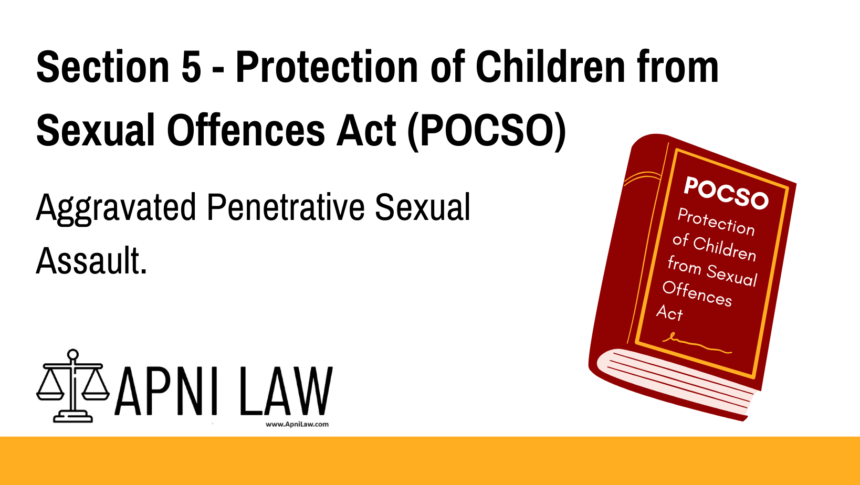Code: Section 5
(a) Whoever, being a police officer, commits penetrative sexual assault on a child —
(i) within the limits of the police station or premises at which he is appointed; or
(ii) in the premises of any station house, whether or not situated in the police station, to which he is appointed; or
(iii) in the course of his duties or otherwise; or
(iv) where he is known as, or identified as, a police officer; or
(b) whoever being a member of the armed forces or security forces commits penetrative sexual assault on a child—
(i) within the limits of the area to which the person is deployed; or
(ii) in any areas under the command of the forces or armed forces; or
(iii) in the course of his duties or otherwise; or
(iv) where the said person is known or identified as a member of the security or armed forces; or
(c) whoever being a public servant commits penetrative sexual assault on a child; or
(d) whoever being on the management or on the staff of a jail, remand home, protection home, observation home, or other place of custody or care and protection established by or under any law for the time being in force, commits penetrative sexual assault on a child, being inmate of such jail, remand home, protection home, observation home, or other place of custody or care and protection; or
(e) whoever being on the management or staff of a hospital, whether Government or private, commits penetrative sexual assault on a child in that hospital; or
(f) whoever being on the management or staff of an educational institution or religious institution, commits penetrative sexual assault on a child in that institution; or
(g) whoever commits gang penetrative sexual assault on a child.
Explanation.—When a child is subjected to sexual assault by one or more persons of a group in furtherance of their common intention, each of such persons shall be deemed to have committed gang penetrative sexual assault within the meaning of this clause and each of such person shall be liable for that act in the same manner as if it were done by him alone; or
(h) whoever commits penetrative sexual assault on a child using deadly weapons, fire, heated substance or corrosive substance; or
(i) whoever commits penetrative sexual assault causing grievous hurt or causing bodily harm and injury or injury to the sexual organs of the child; or
(j) whoever commits penetrative sexual assault on a child, which—
(i) physically incapacitates the child or causes the child to become mentally ill as defined under clause (l) of section 2 of the Mental Health Act, 1987 (14 of 1987) or causes impairment of any kind so as to render the child unable to perform regular tasks, temporarily or permanently;
(ii) in the case of female child, makes the child pregnant as a consequence of sexual assault;
(iii) inflicts the child with Human Immunodeficiency Virus or any other life threatening disease or Infection which may either temporarily or permanently impair the child by rendering him physically incapacitated, or mentally ill to perform regular tasks;
(iv) causes death of the child; or
(k) whoever, taking advantage of a child’s mental or physical disability, commits penetrative sexual assault on the child; or
(l) whoever commits penetrative sexual assault on the child more than once or repeatedly; or
(m) whoever commits penetrative sexual assault on a child below twelve years; or
(n) whoever being a relative of the child through blood or adoption or marriage or guardianship or in foster care or having a domestic relationship with a parent of the child or who is living in the same or shared household with the child, commits penetrative sexual assault on such child; or
(o) whoever being, in the ownership, or management, or staff, of any institution providing services to the child, commits penetrative sexual assault on the child; or
(p) whoever being in a position of trust or authority of a child commits penetrative sexual assault on the child in an institution or home of the child or anywhere else; or
(q) whoever commits penetrative sexual assault on a child knowing the child is pregnant; or
(r) whoever commits penetrative sexual assault on a child and attempts to murder the child; or
(s) whoever commits penetrative sexual assault on a child in the course of 1[communal or sectarian violence or during any natural calamity or in similar situations]; or
(t) whoever commits penetrative sexual assault on a child and who has been previously convicted of having committed any offence under this Act or any sexual offence punishable under any other law for the time being in force; or
(u) whoever commits penetrative sexual assault on a child and makes the child to strip or parade naked in public, is said to commit aggravated penetrative sexual assault.
Explanation of Section 5 POCSO
Section 5 defines when a sexual offence becomes “aggravated.” This classification applies when the offender uses their position, power, or knowledge to exploit a child. It also includes situations where the child is more vulnerable, such as being very young, disabled, or assaulted by a relative.
In addition, the law treats repeated offences or extreme harm (e.g., pregnancy, HIV, death) as aggravated. This ensures stricter punishment and recognizes the serious impact on the child.
The provision guides the courts in applying heavier penalties under Section 6.
—
Illustrations
Example 1: A school principal abuses a student during school hours.
→ The offence is aggravated under Section 5(f) because the offender holds a position of authority.
Example 2: A child below 12 is assaulted by her stepfather.
→ This is aggravated due to both the child’s age (Section 5(m)) and the offender’s relationship (Section 5(n)).
Example 3: A child care worker repeatedly abuses a child.
→ The act falls under multiple aggravating conditions (Sections 5(l), 5(d), and 5(o)).
Common Questions and Answers
Q. What is aggravated penetrative sexual assault?
Aggravated penetrative sexual assault involves extreme circumstances, such as abuse by people in positions of power or when the victim is especially vulnerable.
Q. What makes an assault “aggravated”?
Factors include the offender’s role (police, teacher, doctor), the victim’s condition (under 12, disabled, pregnant), and the method used (violence, repeated abuse, weapons, or causing death).
Q. Is gang assault covered under this section?
Yes. If two or more people abuse a child together, it qualifies as gang penetrative sexual assault under Section 5(g).
Q. What if the child is seriously harmed?
Harm such as pregnancy, disease transmission, or mental trauma increases the seriousness. These are all mentioned as aggravating circumstances.
What punishment applies?
Section 6 prescribes the penalty: rigorous imprisonment for at least 20 years, which may extend to life imprisonment or death in extreme cases.
—
Conclusion
Section 5 of the POCSO Act strengthens child protection laws. It recognizes the severe impact of abuse by people in trusted roles and during critical situations. By labeling such cases as “aggravated,” the law ensures stronger punishments and greater accountability.
For professional legal guidance or to understand your rights better, explore more at ApniLaw.








